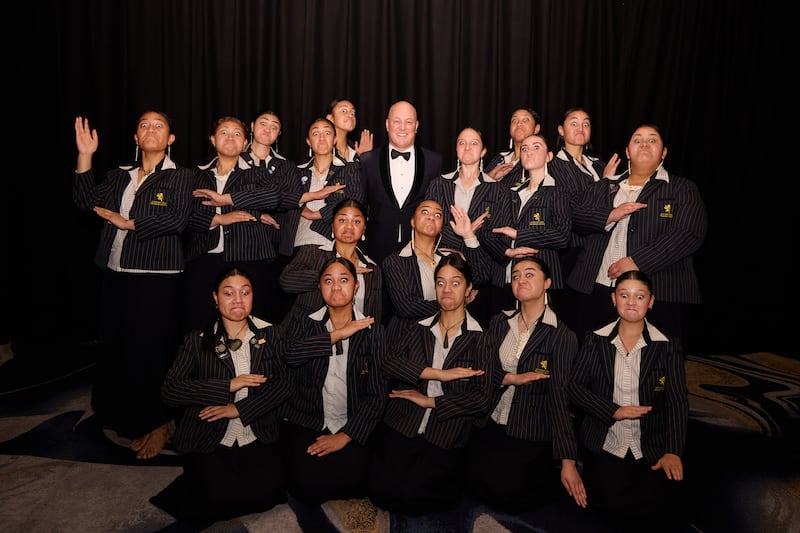Global Women New Zealand (GWNZ) has reached a special milestone, celebrating 15 years of advocating for women’s equity and equality in Aotearoa.
“He kaupapa [tēnei] e tino tautoko ana i ngā wāhine [e] hiahia ana ki te teitei atu i roto i ngā pakihi nui i roto i tēnei ao, i roto i a Aotearoa,” Global Women director Karleen Everitt (Te Iwi Mōrehu, Te Aupōuri, Ngāpuhi) says.
(This initiative supports women who aim to reach new heights in bigger companies around the world and in Aotearoa.)
With more than 400 members nationwide, the non-profit organisation supports wāhine in their career advancement, preparing them for higher leadership roles through development programmes.
They marked the occasion with a gala dinner in Tamaki Makaurau, attended by some of Aotearoa’s most notable business leaders and GWNZ members, including Dame Jenny Shipley, Dame Theresa Gattung and Dame Rosanne Meo.
Everitt reflects on many wāhine Māori who have championed the Global Women kaupapa over the years.
“[Kei te] mahara ki a Tania Simpson, a Mavis Mullins, a Tracey Houpapa mā, rātau [e] kaha [ana] ki te tautoko atu i a Global Women,” Everitt says.
(I remember Tania Simpson, Mavis Mullins‚ Tracey Houpapa and those who were avid supporters of Global Women.)
“People like Arahia Bennett are members, Linda Smith - they’ve been all of our role models.” Global Women chief executive Agnes Naera (Ngāpuhi, Ngāti Raukawa) says.
More than 40 percent of CEOs in NZ are women and Naera took on her role in 2020 - making her Global Women’s first Māori chief executive.
“That was kind of a significant step for the organisation to have a woman from the public sector. I was probably lots of things that Global Women weren’t at the time but it was a sign that we were evolving the organization.”
Before joining Global Women, Naera worked extensively in education and leadership development, particularly in universities.
“We have a board of nine [diectors] and we have four Māori wāhine.”
“But that aside, my Ccair is Dame Theresa Gattung and she certainly walks with us and for us. It is really important that we won’t get there by ourselves, we do need those allies.”

Prime Minister Christopher Luxon was also there to support the occasion.
“We know that having more women in leadership brings about greater diversity, but also carries huge social benefits,” he says.
GWNZ says it is committed to increasing gender diversity as well as Māori and ethnic diversity. It represents more than 60 organisations including Toyota, Spark, Westpac, Air New Zealand, Fonterra, and New Zealand Post (a workforce of 170,000).
New Zealand’s gender pay gap is currently over eight per cent, with the gap being even wider for Māori and Pasifika women.
“Our core advocacy is closing that gender pay gap, motherhood penalty, we’ve done some work in the space of menopause. But anything that stops women from a career choice, a promotion or better economic kind of income, that’s the place we play.” Naera says.
Everitt also highlights the cultural shifts within the corporate space.
“Kua kite atu i te huringa o ngā pakihi nui ki tō tātau ao Māori, i hanga atu i ngā rautaki Māori.”
“Ko te korero i roto i tērā kaupapa o te Tiriti o Waitangi, kia noho pai a Māori mā, a Pākehā mā. Kia piri anō tātau, kia mahi anō i a tātau i o tātau taha - kaua e wehe.”
(I’ve seen a lot of the big businesses turn to te ao Māori and create Māori-centric strategies. It also speaks to that in Te Tiriti o Waitangi - for the betterment of Māori and Pākehā. That we may unite as one, side by side and not be divided.)
“My vision for Global Women is that one day we won’t have to do this mahi,” Naera adds.
“That we will see many many more Māori on boards and leading our countries our communities and our businesses.”
Naera will step down from her role in 2025, with high hopes for the future of Global Women.


